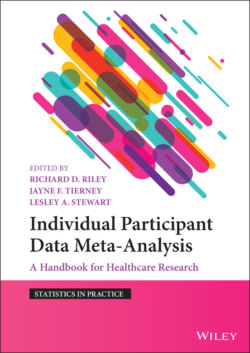Читать книгу Individual Participant Data Meta-Analysis - Группа авторов - Страница 33
3.2.1 Collaborative IPD Meta‐Analysis Project
ОглавлениеIPD meta‐analysis projects are most commonly initiated and carried out by a central research team, who establish a wider collaboration including representatives of the included trials. Partnership with trial investigators brings benefits in terms of detailed understanding of the topic area as well as generating ‘buy in’ and ultimately supporting provision of IPD. It also gives trial investigators appropriate academic credit through membership of the collaborative group, in whose name the IPD project is often published. However, direct involvement of trial investigators is at odds with some systematic review standards, such as those produced by the Institute of Medicine which recommend that systematic reviews are undertaken by those who are independent of the primary studies and who do not have vested interest in the review outcome.73 This standard is much easier to comply with when using aggregate data extracted from trial publications. In our view, attempting an IPD meta‐analysis project without some degree of involvement from trial investigators (over and above simply providing or allowing access to their IPD) would significantly reduce the chances of successful completion, and could lead to less insightful and nuanced interpretation of findings. Nonetheless, direct involvement (as a member of the central research team or otherwise having a decision‐making role) of those whose trial is included in the IPD meta‐analysis, or who otherwise hold strong views about the anticipated findings of the research in question, has potential to be both problematic and undermine credibility.
Figure 3.1 Typical phases of an IPD meta‐analysis project.
Source: Lesley Stewart.
Therefore, establishing a mechanism that allows trial investigator involvement without permitting vested interest is vital. One approach that may help safeguard against undue influence, whilst still valuing and benefitting from partnership, is for the central research team to have clearly understood responsibility for all aspects of project design and analysis. Whilst the team will listen to advice from both trial investigators and independent advisors (including patients and public stakeholders), and take this into account, they will be responsible for judgements and decisions made. For example, which trials are included, which outcomes are analysed, and which subgroups are examined. Under this framework, the research team should ideally exclude anyone responsible for an included trial. However, it can be difficult to gain sufficient expertise and understanding of the research topic if anyone who has involvement with an eligible trial is precluded from membership of the IPD project’s central research team, particularly for rare health conditions. Thus, a degree of transparent pragmatism may be needed. Certainly, those who have strong beliefs (e.g. about whether an intervention works overall or only in certain individuals, whether particular biomarkers are predictive of treatment effect) or who stand to gain financially or professionally according to the results of synthesis, should not be part of the central team. It is important that the responsibilities of all partners are thought through well in advance, and are made clear to all from the outset of the project, possibly through inclusion in a project scope (Section 3.3) or charter (and later in the protocol; Section 4.2.2), as well as being reflected in the data‐sharing agreement. An advisory group can also help ensure that the central research team maintains its independence (Section 3.6).
